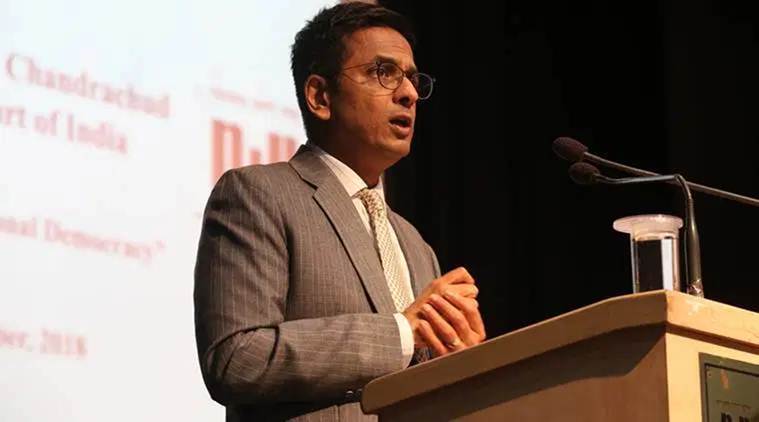 Justice Chandrachud said: “Unlike the American system, where you can pick up someone from public life and ask her to become a judge of Supreme Court, we don’t except for the eminent jurist category have that liberty under out Constitution.
Justice Chandrachud said: “Unlike the American system, where you can pick up someone from public life and ask her to become a judge of Supreme Court, we don’t except for the eminent jurist category have that liberty under out Constitution.
Supreme Court judge, Justice D Y Chandrachud, on Saturday mooted the idea of short-term appointments to the higher judiciary and suggested that lawyers can come in for a specific period in High Courts and then return to practice.
At the same event, former Supreme Court judge, Justice A K Sikri, said the Collegium system of appointment of judges “needs reconsideration”, and that “India is the only country where judges appoint judges”.
The two were speaking at a panel discussion on the occasion of launch of the book ‘The Cases That India Forgot’, written by Chintan Chandrachud, Justice Chandrachud’s son and a scholar.
Justice Chandrachud said, “We always joke that once a judge, you are a judge for the rest of your life. I think we need to think outside the box. Why can’t we bring into judiciary people who will come in for shorter periods and go back? You are doing that now in government — you have lateral entry into the government at very senior level. Why do we have to believe that when we recruit a judge as a district judge at the age of 25, that person will continue all the way to 62 or 65? Why don’t we think of bringing in lawyers, for instance, on short-term appointments to High Courts, say for five years?”
“A lawyer from Delhi HC who hasn’t become a career judge will come in at the age of 50. Work not in Delhi HC, but in Bombay HC or Gujarat HC; work for five years and then go back…” he said.
To a specific question about the Collegium system, Justice Chandrachud said it is “constitutional”, and “that is the law as it stands”. One thing that could be done is to increase diversity in the judiciary, increase women’s representation, he said. But this, he said, is “easier said than done”, as in many states, there is “asymmetry in terms of growth and development of women’s education, which reflects in the number of women at the Bar”.
Justice Chandrachud said: “Unlike the American system, where you can pick up someone from public life and ask her to become a judge of Supreme Court, we don’t except for the eminent jurist category have that liberty under out Constitution. So one area where I think we need to do some work is to bring about a greater sense of diversity within the judiciary.”
“I think laying down transparent norms on the basis of which we will assess individuals for higher judicial office will be one very important step we can take towards making the Collegium system of appointment more transparent,” he said.
Justice Sikri said, “Most of the time we (appointing judges) go by our impressions. It may not be a scientific study made about a particular candidate…therefore many times those may be aberrations; those who are taken, they may not be deserving, and many times, those who are deserving are let out.” That, he added, “needs to be taken care of”.
Asked about the book, Justice Chandrachud said its central theme is that “increasingly courts have not just become social institutions for resolution of conflicting claims over private rights, or conflicting claims over public rights, but we have become institutions for social engagement…. That is why perhaps there is so much of critique about the courts and the work that the courts are doing.”
He also said that judges remain partly insulated from the society given the role they perform, and that “insulation is good in so far as your work is concerned as a judge — like nobody can call you up and tell you what to do. But equally, that insulation should not be taken to a point where the meaning of the work which courts do doesn’t get transformed into the lives of society.”
The Indian Express is now on Telegram. Click here to join our channel (@indianexpress) and stay updated with the latest headlines